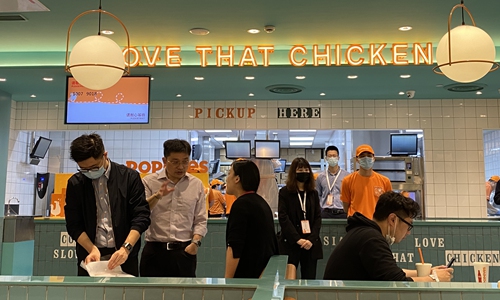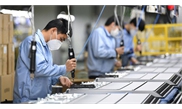
US fried chicken restaurant chain Popeyes plans to open its first store on the Chinese mainland on May 15. The store is located in Shanghai. Photo: Xie Jun/GT
From Popeyes to Costco and Tesla, foreign enterprises are in a rush to clutch the Chinese market either by opening its stores or expanding the scale of existing investment, as the country continues to endure the aftermath of the coronavirus epidemic boldly.
Popeyes, a US-based fried chicken restaurant chain affiliated with Restaurant Brands International (RBI), announced to open its first restaurant in the mainland, located in downtown Shanghai, on May 15. Outlining its ambitious expansion plan Popeyes said, it looks to open 1,500 stores in the Chinese mainland in the next 10 years. Popeyes is run by TAB Food Investments (TFI) in China.
"We are very positive with the prospects of the Chinese market, as we have a positive outlook on the Chinese economy, and the market is huge with growing middle class and urbanization rate. The foundation is still very strong," Raphael Coelho, CEO of Popeyes China, told the Global Times.
He also said that the company plans to explore the Chinese market in the long run so that temporary setbacks like the coronavirus wouldn't sway their business strategy for China.
Some other foreign companies are also expanding their investment in China. US supermarket giant Costco, for example, is reportedly pushing to open a new store in Suzhou of East China's Jiangsu Province in two years and a second store in Shanghai.
"These examples prove the appeal of China's market to foreign brands despite the pandemic disruption and perhaps some government thwart," Ye Hang, an economics professor at the College of Economics at Zhejiang University, told the Global Times.
According to Ye, as China is among the first batch of countries to resume production, some foreign companies might be impelled to shift focus to the Chinese market as their business is weighed down by the pandemic elsewhere.



